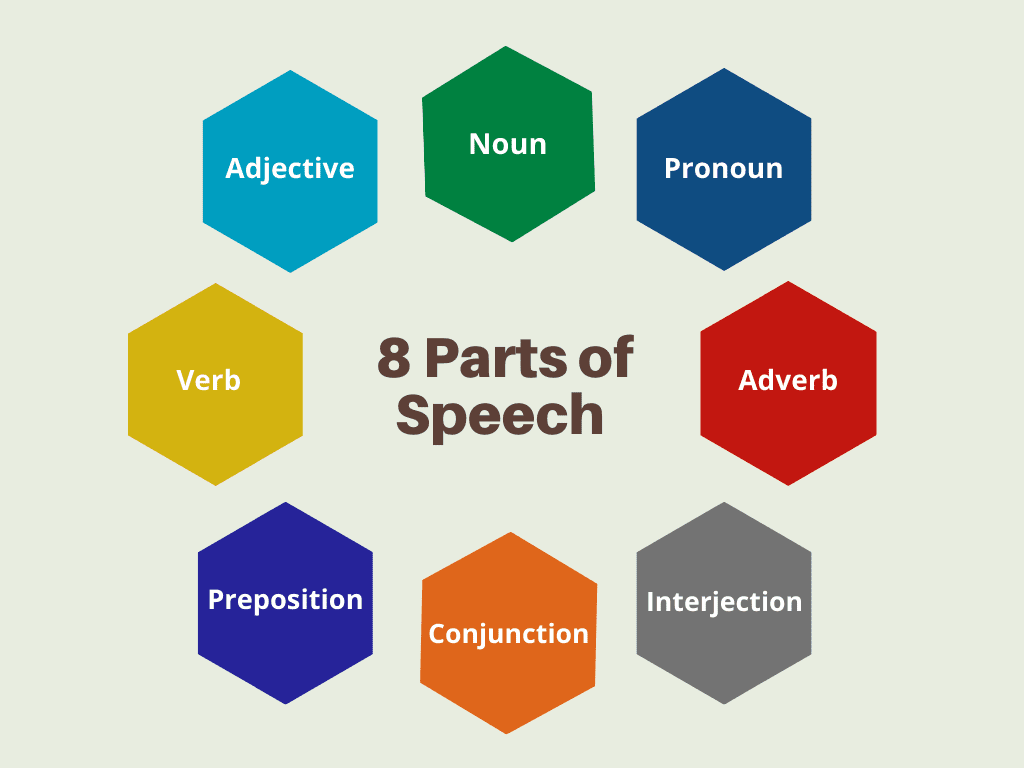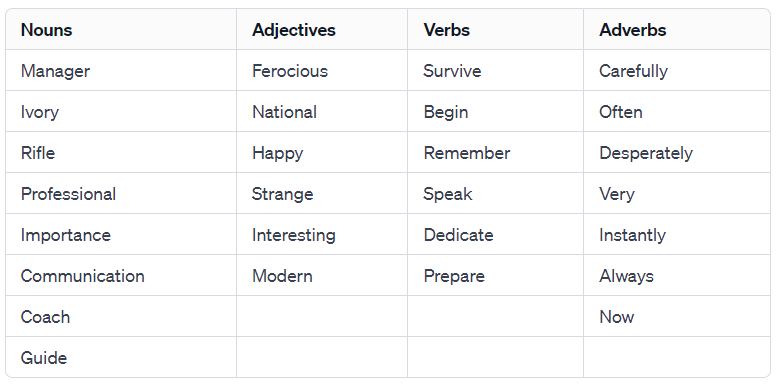
8 Parts Of Speech In English
(1) Nouns:
The name of things, places, animals, people, qualities, or feelings are called Nouns.
Ex.
(thing) – book, computer
(Persons) – Boy, girl
(Places)- Shahapur, Mumbai
(Animals)-dog, cat
(Qualities)- Courage, brave
(Emotions)-fear
(2) Pronouns:
Pronouns are the words that are used in place of nouns.
Ex.
I, we, you, he, she, it, they, me, us, him, her, them, our, etc.
(3) Adjectives:
Words that are used to describe a noun are called Adjectives.
Ex.
new shirt, sweet mangoes, brave siblings,
fast train, small village
(4) Adverbs:
Words that tells us something more about verbs or Adjectives or other Adverbs are called Adverbs.
Ex.
(1) He ran fast.
(2) My laptop is there.
(3) He met me yesterday.
(5) verbs:
Words that express or state are called verbs.
Ex.
(1) They went to school.
(2) He wrote a letter.
(3) He made a kite.
(6) Prepositions:
Prepositions are the words that are used before a Noun or a pronoun to show the relationship of these words (Noun or Pronoun) to some other part of the sentences.
Ex.
He came with me.
The book is on the table.
I go to school by bus.
- On: The book is on the table.
- In: She was in the garden.
- Under: The cat hid under the bed.
- Between: The park is between the museum and the library.
- Over: The plane flew over the mountains.
- Through: They walked through the forest.
- Against: The waves crashed against the rocks.
- Beside: He sat beside his friend.
- With: She came with her brother.
10.Without: They left without their umbrellas.
(7) Conjunctions:
Conjunctions are words that join together two or more words or sentences.
Ex.
(1) Sakshi and Arya are sisters.
(2) Santosh is poor but honest.
(3) They must work or they will starve.
(8) Interjections:
Words that express an emotion or some sudden feelings are called Interjections.
Ex.
(1) Hurrah! We have won the match.
(2) Alas! He is no more.
(3) Oh! He has dropped the catch.
A1. Classification of words
Write the words given below correctly in the table.
manager, carefully, survive, ferocious, often, ivory, begin, desperately, rifle, professional, importance, national, remember, very, happy, instantly, strange, interesting, speak, coach, modern, dedicate, communication, guide, always, prepare, now,

Ans:

A2. Find out if the underlined words are nouns, adjectives, verbs or adverbs.
(1) It was very busy morning.
(2) It was a lovely morning.
(3) This is the fast train.
(4) They were watching the sky carefully.
(5) You might eat up some of my acorns.
(6) He always welcomes his students.
(7) She looked pale.
(8) Every child has a right to education.
(9) Baba began to read extensively about leprosy.
(10) The thief held on tightly to the tiger’s back.
(11) He must be more powerful than me.
(12) Baba was deeply influenced by a saint called sane Guruji.
Ans:
- very (Adverb)
- Lovely (Adjective)
- fast (Adjective)
- carefully (Adverb)
- eat (Verb)
- Always (Adverb)
- pale (Adjective)
- right (Noun)
- began (Verb)
- tightly (Adverb)
- powerful (Adjective)
- deeply (Adverb)
A3. Parts of Speech
Write what parts of speech the underlined words in each sentence given below are.
(1) Samir and John are watching film quietly.
(i) Samir –——– (ii) are watching –——–
(iii) and –———-(iv) film –——–(v) quietly –——-
(2) You have a right to say so.
(i) you –——— (ii) right –——–
(3) Turn to your right side.
(i) turn –——– (ii) right –———-
(4) He answered right.
(i) answered ———— (ii) right———
(5) Oh! He has dropped the catch.
(i) Oh! ———- (ii) he ———–
(iii) has dropped ———— (iv) catch ———-
Ans:
(1) Samir and John are watching film quietly.
(i) Samir – Noun
(ii) are watching – Verb phrase
(iii) and – Conjunction
(iv) film – Noun
(v) quietly – Adverb
(2) You have a right to say so.
(i) you – Pronoun
(ii) right – Noun
(3) Turn to your right side.
(i) turn – Verb
(ii) right – Adjective
(4) He answered right.
(i) answered – Verb
(ii) right – Adverb
(5) Oh! He has dropped the catch.
(i) Oh! – Interjection
(ii) he – Pronoun
(iii) has dropped – Verb phrase
(iv) catch – Noun
